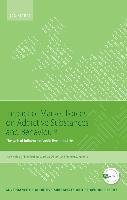The differences between alcohol, food, gambling, and tobacco as consumer products are obvious. Yet research suggests that there are underlying similarities in the way that food, alcohol, and gambling industries are replicating the tobacco industry's strategy of attempting to influence and determine public health policy.Impact of Market Forces on Addictive Substances and Behaviours examines the 'web of influence' formed by industries which manufacture and sell addictive products and trade associations and policy intermediaries such as lobbyists and think tanks in the EU. Using a new dataset on these corporate networks, it quantifies the strength of the connections between the actors in these webs, and uses this data to guide qualitative studies on the content of corporate strategy and, specifically,on corporations' attempts to 'capture' policy and three crucial ancillary domains: science, civil society, and the news and promotional media.The study draws on the structural data to outline the comprehensive engagement of industry with policy issues at the EU and the ways in which corporations and stakeholders attempt to influence policy in their favour. It concludes by asking what kinds of solutions might be possible to the evident public health challenges posed by the addictions web of influence, and proposes key reforms that have the best chance of minimising the impact of disease stemming from addictions in European countries.Impact of Market Forces on Addictive Substances and Behaviours is based on the research from ALICE RAP, a multidisciplinary European study of addictive substances and behaviours in contemporary society. This is an essential resource for public health researchers, policy makers in the addictive substance and behaviours field, and academics specialising in the fields of governance of addictive substances and behaviours and public health, as well as GPs and social workers wishing tosupplement their knowledge on current addiction issues.

